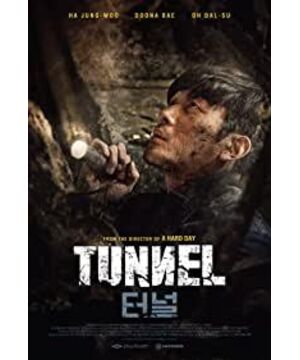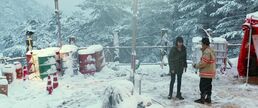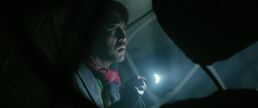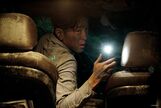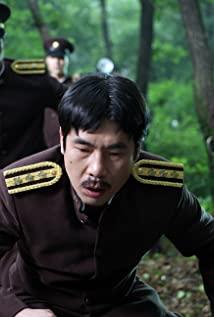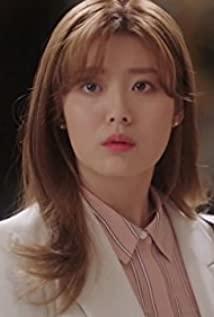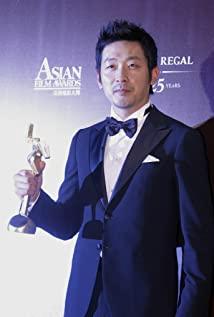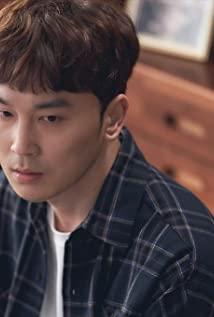Recently, many marketing accounts have finished "Travel to Busan" and started to enjoy "Tunnel".
It is recommended that children who have not watched the film can watch those Amway texts first~
This is not an Amway text, nor is it a film review or interpretation. It is just a review and farewell of "Tunnel" by myself.
Because there are a lot of spoilers, it is only suitable for sharing with friends who have already watched "Tunnel"~
#缘起: The accumulation of expectations The
first time I heard of "Tunnel" was in May last year. At that time, it was only said that director Kim Sung Hoon of "To the End" was preparing a new film, investing in showbox, and casting roles.
I have seen two Korean movies related to tunnels in 2014, but they are not the kind of road tunnels in "Tunnel". A "Tunnel 3D" is a 3D horror movie starring Jeong Yoomi, Yeon Woojin, Min Dohee, and Song Jae-rin. It tells the story of five young men and women traveling to a high-end resort who went to death in an abandoned tunnel that was forbidden to enter and exit for 20 years. story. There is also a thriller starring Jung Kyung-Hao, Kim Sai-lun, and Jung Yu-mi. It tells the story of the serial kidnapper Soo-chul, the kidnapped Soo-jeong, and her sister Yeon-rui who are looking for Soo-jeong in an underground tunnel (okay , Is actually the life and death pursuit of the sewer.
Speaking of it, I heard the introduction of "Tunnel" at first glance-"tell the story of the man trapped in the tunnel fighting alone", in fact, there is not much expectation. But I also want to watch it when it comes out. There was only one reason at that time-director Kim Sung Hoon.
After director Kim Sung-hoon directed "The Influence of Lack of Love on Two Men" in 2006, "To the End" which was dormant for many years in 2013 and directed by the screenwriter made him shortlisted in Cannes and became famous overseas. The best director of Chunshi is the only director Jin Hanmin, who is sadly defeated by Qinglong in "Mingliang". I believe that friends who have watched "To the End" will never forget the scene of Li Sunkyun's corpse hiding in the coffin. It is obviously nervous enough to make people look at it, but cleverly creates a comedy atmosphere.
It didn't take long for Ha Jung Woo to star in "Tunnel". As a fan of Ha Jung Woo, for me, this film is destined to not just watch it again. The coincidence of the starring director of the same name is also a good talk. Ha Jung Woo’s real name "Kim Sung Hoon" is actually the same as the Korean of Director Kim Sung Hoon. Both are called 김성훈. They are just the difference in Chinese characters. From the perspective of Koreans, they naturally have the same name.
The media also exposed that the film was adapted from the original novel of the same name by Su Zaiyuan, known as "the beautiful male writer". His first novel "I Was a Cowboy" published in 2008 was adapted and directed by Yin Zhongbin, starring Ha Jeongwoo and Yin Qixiang. "Beast Boy", and 2010's "Finding Wings of Hope" was adapted into "Su Yuan" directed by Li Junyi. Many Chinese viewers are more familiar with the latter. In 2014, they also set off a craze for Korean movies in China with "The Defender", no less than the recent "Busan Tour". In addition, the producer Jang Won-seok is the representative of the production company LDV, and he has worked with Ha Jung Woo alone in "War against Crime", "Beast Boy" and "Hsu Sam Guan". He was also the producer of director Kim Sung Hoon's previous film "To the End" .
After that, Wu Dashu and Pei Douna joined one after another, and the increasingly reliable team made the expectations soar.
Last year, Ha Zhengyu bought the original novel after he confirmed his starring, and then by chance he got the script which I don’t know which was the first draft, and finally saw the film in August at the trial screening. The comparison of the three is even more sensational. Intersection. Now that the domestic resources have been released, almost all the friends who want to see have seen it, and it is time for me to say goodbye.
#电影: Irreplaceable He Zhengyu
Many people were worried that "Tunnel" would be too similar to "Horror Live". They were all facing the disaster in a limited space to satirize social issues. However, Lee Jung-soo, the head of the family who worked hard to survive, is different from Yoon Ying-hua, the radio host who exclusively connects terrorists for reinstatement. So when they face difficulties, they also have completely different performances, which will not make the audience think.
Director Kim Sung-hoon's unique dexterity and grasp of commercial films continue from "To the End" to "Tunnel", obviously becoming closer to the audience. It is still a rapid development, portraying the protagonist's process of overcoming the crisis, but it creates more points that are clearly sad but funny. When director Kim Sung-hoon received a directing proposal, he hoped to change the dark tone and tragic ending of the original novel. Director Kim Sung-hoon said that it might be because he didn't understand the grammar of movies and was not limited to classics, so he wanted to create a fresh work. In his opinion, the most important factor in commercial films is fun.
After "Tunnel" was released, the media commented that the film broke the formula of a disaster movie. The disaster occurred in the narrow space inside the collapsed tunnel. It has a completely different atmosphere from the large-scale disasters such as typhoons, tsunamis and earthquakes that people imagine when they mention disaster movies. There are not too many victims, and there is no need for a hero to save all mankind. There are not too many clues to lay the groundwork, the disaster is so sudden, it can happen to everyone, and you will be caught off guard. Compared with ordinary disaster movies that portray the suffering of victims, the protagonist in "Tunnel" shows a more positive and optimistic, even humorous appearance.
Ha Jung Woo, who plays the actor Lee Jung-soo, also matches the humor of director Kim Sung-hoon, and his performance makes this role closer to Ha Jung-woo himself. In addition to good acting skills, the actors that director Kim Sung Hoon needs are actors who can shine in the dark space of the tunnel. Being innocent, optimistic, or even a little silly like a child can brighten the color. Because Director Kim Sung-hoon felt that only with the spirit of optimism can it be possible to persevere in such a predicament.
After confirming the starring role of Ha Jung Woo, Director Kim Sung-hoon took snacks to the Japanese troupe. Ha Jung-woo who was filming "Miss" at the time, and Ha Jung-woo and Director Kim Sung-hoon, who happened to finish filming their own scenes, hit it off and went to Osaka together. Four days and three nights, discuss the script by the way. Director Kim Sung Hoon said that the script meeting with Ha Jung Woo at that time had a great influence on the completion of the film's script. He also said that He Zhengyu is also a king of ideas, and there are new ideas coming out from morning to night, and even when he falls asleep, he suddenly jumps up to come up with a new idea. Director Kim Sung Hoon is also a person who can accept the opinions of actors. In addition, Ha Jung Woo also has a lot of improvisations at the shooting site. Director Kim Sung Hoon also said, "You can act whatever you want, I will look back at the cut"... Perhaps this is why many movie fans think that Lee Jung-soo is very similar to Ha Jung-woo himself.
Unlike the previous "Miss", it’s a calculated and formulaic acting technique, and it’s not like the one-man show, "Horror Live", which has the setting of the host identity. Instead, it happens naturally as you like, looking like Ha Jung Woo himself. Of survival. Speaking of which, He Zhengyu also suffered a lot in order to shoot this film. In such a narrow space, even the camera is hidden in the rock, 6 days a week, 12 hours a day, continuous shooting for two months. Obviously he is allergic to dust. In the car chase scene in "Assassination," I was sour when I was sprinkled with bean flour. This time I was sprinkled with various powders, sneezing, my whole body was hot, and the pimple on the forehead was filmed. It hasn't gone down for seven months. It's not easy to say.
As you can see, this is a role that suits Ha Jung Woo and it is not Ha Jung Woo. (If you encounter any questions about the desert island survival belt in the future, please answer Taihe Zhengyu decisively.) Whether it is a one-man show or a unique humorous ridicule, he has long been familiar with it. Director Liu Chengwan once said that He Zhengyu was "the first person in grievance acting", and now he has reached a higher level, reaching the realm of "the more wronged, the more funny". But for those who have watched Ha Zhengyu's performance too much, they may feel like me that there is not much breakthrough compared to the past. It feels like "Well, that's right, this is Ha Jeongwoo", not "He Jeongwoo actually has such a side". The latter tends to leave a deeper impression on people. Only when the audience forgets the actors themselves can they really enter the role. (So now I am even more looking forward to seeing a fresh servant from the underworld in "Walking with God".)
In addition, the weight change of Lee Jung-soo after being trapped in the movie is not obvious. Although the photos released at the earliest film festival have lamented that they have become thinner faces, the feelings are not obvious when actually watching the film. There are also the claustrophobia that Lee Jung-soo may change in a closed environment, and the physical and mental pain that his wife has experienced in the face of the media and the suffering of the surrounding people, which have also been drastically omitted. This is indeed one of the reasons why the audience feels that the role is not realistic enough.
However, Director Kim Sung-hoon also said that he only hopes that "Tunnel" will give the audience the impression that it is an interesting movie. He thinks that the movie tickets and two hours are worth it. I also hope that the audience can be comforted by seeing this character. He never thought of catching the audience's eyeballs with a big scene, nor did he think of making "Tunnel" a classic name of "The Most What" in the history of filming. So there is no need to be responsible for the hard-to-talk expectations. It is also because it is a commercial film, so it is more rounded, more relaxed than the original, and more suitable for the public to watch.
By the way, many Korean viewers feel that "Tunnel" is alluding to the time issue. In fact, the novel "Tunnel" was written before the Suiyue issue, and the screenplay by Kim Sung Hoon was written after the Suiyue issue. Director Kim Sung-hoon said that the film and the time issue are not related, and did not realize the correlation between the two when planning, but it is understandable that everyone feels that there is a correlation, after all, it is a heartbreaking disaster. This is why, as a commercial blockbuster with an investment of 10 billion, it did not overwhelmingly create momentum during the propaganda stage. On the contrary, it makes people feel a little hidden. It is also worried that some people will attach political attributes to the movie in advance and go to the movie with prejudice. . Compared with other films in the same period, "Tunnel" is not cheap and topical, but it is low-key and unwilling to cause controversy. In the early days of the film’s release, South Korean film critics compared the film with the time issue to criticize the film’s "frivolity" and inadequate criticism of society. The two should not have been compared. With such a realistic tragedy as Suiyue, who would bear the heart to make a commercial film and put it on the big screen. "Tunnel" is just "Tunnel".
————————————————————————————
#原著: The ending is darker and desperate.
In the words of the original author Su Zaiyuan himself, the first publicly published novel "I was a Cowboy" was written to cater to the publishing house and the public, but to get the opportunity of a newcomer writer to appear. In fact, before "I was a Cowboy", "Tunnel" was already written, "Tunnel" is the first work in the true sense. After writing "Tunnel" for five years, I dare not take it out. On the other hand, I feel that there are still many shortcomings in the debut, and I am afraid that the readers will be disappointed. However, before the official publication in 2013, it was confirmed that it would be remade into a movie.
The tunnel collapsed in just 5 minutes after the movie "Tunnel" started, and this rapid expansion was also well received. The novel is even more straightforward. It opens with "Fuck, what's the matter?" This is the first sentence of Lee Jung-soo, who has already experienced the collapse of the tunnel, after he wakes up. At that time, he thought it was just a minor accident. He calmly called 119, called the insurance company, and called his wife who was waiting for him to come home to celebrate his daughter’s birthday. He smiled and said that after going out for a while, he would buy a bottle of red wine to go home. Drink together. It's not like in the movie, the wife just happened to see the news in the supermarket.
Compared with Lee Jung-soo in the tunnel and the disaster he faced in the novel, more attention was paid to the changes in the attitude of the media and the public as the event progressed. The tone is much darker than in the movie. The protagonist’s dilemma comes not only from the dark tunnels where he can’t see ignorance, but also from the outside world. In addition to the construction unit of the tofu dregs project, government officials who only worry about performance, media reporters who only want to scramble for exclusive reports, and talkative critics, the verbal violence of netizens is also a catalyst for tragedy. These dilemmas for the outside world are much more described than in the movies.
Lee Jung-soo’s wife, Kim Mi-jin (different from the movie’s name), rushed around to ask people from all walks of life, including construction companies, road communes, police stations, etc., actively calling for help for her husband but hitting walls everywhere, and it was much more difficult than in the movie. However, Lee Jung-soo persisted without knowing it, stubbornly keeping the cake for his daughter, writing a letter to his wife every day, looking forward to the day of reunion.
At the end of the novel, the people who had just started to support Lee Jung-soo also became indifferent because of the inconvenience of life caused by the collapse of the tunnel, and the rescue work seemed to no longer have any hope. In addition, the rescuers were sacrificed because of the accident, and the time has passed too long for Li Zhengzhu to continue his life. Li Zhengzhu’s wife was pressured by all parties. When Li Zhengzhu was trapped for 31 days, she was forced to sign the agreement to stop rescue. No one believes that Lee Jung-soo is still alive, and no one sympathizes with his wife and children anymore, but regards them as murderers. In the end, his wife was forced to use the radio to read the last letter to Lee Jung-soo, who did not know his life or death, telling him that there would be no rescue. If he is still alive, give up his life. After hearing the death notice from his wife in the tunnel, Lee Jung-soo also wrote the last letter and set himself on fire in the car in despair.
The 194 pages in the book are the last letter that Lee Jung-soo wrote before committing suicide. There is no time for
the last letter to my beloved you
. It seems that this should be stopped, as you would expect. I don't know if I am alive or dead now. Is it dead, just an undead waiting to be rescued? Is what people say is right? I imagined it this way. The rescue team came and my body was decomposed. People who had never seen me dug up my body... Such a terrifying imagination. If I see this letter, it means I am not dead yet. I hope this letter can be conveyed and prove that I am still alive. I love you, I love you. If this is the best effort, then I will not complain. For happiness. farewell.
See the tears.
After the rescue stopped, the work of clearing up the debris in the tunnel continued. Two days later, the vehicle burned by Lee Jung-soo was discovered. The autopsy concluded that Lee Jung-soo's death was two days ago. The media and netizens who had argued that he was dead long ago remained silent.
Three days after Li Zhengzhu's death, no one came to the funeral, and the huge compensation was handed over to his wife, Jin Meizhen.
Five days after Lee Jung-soo’s death, the media reported that Kim Mi-jin had received compensation. Netizens began to accuse Kim Mi-jin of forcing Lee Jung-soo to death, saying that she was a witch who exchanged her husband’s death for money. The media even used the name of the right to know. Exposing Jin Meizhen's address has caused her to be harassed.
Fifteen days after Lee Jung-soo’s death, the farewell letter that Kim Mi-jin read on the radio and the letter that Lee Jung-soo wrote to his wife every day in the tunnel were widely disseminated by the media and SNS, which made the accusation of Kim Mi-jin even more serious.
In the end, Kim Mi-jin took her daughter Soo Jin to commit suicide by burning charcoal in the car. However, the media and netizens still accused her of killing her even her daughter. It was not until ten days later that she ceased to make headlines and gradually disappeared.
One year after Li Zhengzhu's death, the tunnel was reopened. The builders of the tofu project that caused the tragedy of Lee Jung-soo are performing a memorial ceremony for the opening of the new tunnel. The tragedy of Lee Jung-soo has long been erased from memory. Only the experts who worked hard to save him shouted: "I will not forget, and you must not forget."
The ending of the novel is truly desperate. In the movie, Lee Jung-soo tried hard to honking his car horn until the last moment without giving up his hope of life. He just happened to meet a rescue captain who did not give up on him. Compared to Lee Jung-soo in the novel, how lucky he is.
There are other differences between novels and movies. For example, in the novel, Lee Jung-soo and his wife are a weekend couple separated from the two places, and his daughter Soo Jin is actually the child that his wife had previously given birth to with other men. The season of being trapped in the tunnel is summer, and Jeong-soo can listen to the news in addition to classical music programs on the radio. The role of an expert who advises on rescue work is also incorporated into the rescue team leader played by Wu Dashu in the movie.
————————————————————————————
#Script : The choice of tragicomedy or commercial film. The script created by the director Kim Sung-hoon pays more attention to Lee Jung-soo and the disaster itself than the original, and it is more relaxed than the original, more pleasant than the original, and more hopeful than the original. Whether this is good or bad, different people can only have their own opinions, and each audience has their own judgment. Some people like tragedy and some like comedy.
Audiences who have watched novels and then watched movies will naturally have different opinions. People who feel that the original work is too aggrieved may find the film very refreshing and comforting, while those who feel that the original work is very profound may feel that the film is a little bit tedious. Both viewpoints are reasonable, and there is no need to draw conclusions, at least the choice of Director Kim Sung Hoon should be respected. He has satirized various social problems in South Korea in his own way and on the scale he deems appropriate. I personally feel that turning the end of a tragedy into a comedy makes it easier to enter the public to give people hope and comfort, but it also loses a little shocking power. Therefore, "Tunnel" failed to become the second "Melting Pot" and aroused strong social response, nor did it become the second "Horror Live", with a suicidal ending that gave people shock and endless aftertaste.
The job set for Lee Jung-soo in the movie is the section chief of a Kia automobile agency. Flashlights and nail clippers are things that auto dealers often give to customers as gifts, so it’s not surprising that they appeared on Lee Jung-soo’s car. Director Kim Sung-hoon tried his best to find the rationality (his brother-in-law worked in a car dealership), but it was a pity that the audience ignored or even complained. As for the mobile phone battery that everyone is complaining about, I have never tried to use it for only two minutes a day. How long can it last? It is not easy to follow the trend.
The script also includes the girl Mina and Puppy who are not in the novel, which is also a great stroke of director Kim Sung Hoon. In such a difficult environment, Mina's appearance is undoubtedly a comfort to Lee Jung-soo, but also a test, showing the beauty of Lee Jung-soo's human nature. Lee Jung-soo had chat and companions who were waiting for rescue together. While feeling at ease, he also wanted to share the food and water that sustain life. He obviously felt distressed about the little water left, but even took it out and distributed it to Mina. When Mina drank it, his face twitched while watching. There is such a delicate expression of humanity in the movie. However, when Mina died seriously injured, he was unwilling to believe, and continued to pour water for Mina with a trembling hand, without even discovering that the water had overflowed. The appearance of Mina also makes the audience think about whether they can really share selflessly if they are in such an environment.
There is a follow-up to this part in the script, but unfortunately the film was not shot (or was it not released?). I think it’s an excellent description of Lee Jung-soo’s ambivalence. Maybe I didn’t want Lee Jung-soo to be a bad person when filming... In the script, while Mina was dead, he asked Lee Jung-soo for water, and Lee Jung-soo hesitated for a long time. Replied with difficulty, "it seems to be gone", and then felt unbearable looking at Mina who was thirsty, and said to herself "Wait a moment", and went back to her car to find water. When she returned to Mina with the remaining 1/3 bottle of water, she found that she had died of breath. After crying for a while, Lee Jung-soo called his wife in the early morning, and the two had a conversation like this.
Sehyun: Jeongsu, what happened? Are you OK?
Jeong-soo:...that...she passed away.
Shixian:...!
Jeong-soo: (choked) She asked me for help, but I didn't promise...
Sehyun:...Don't blame yourself. You have done enough...
Jung-soo: No. She asked me for water before she died... I lied that there was no water.
Shixian: ...anyone could do this in that situation. Husband, it's not your fault.
Jeong-soo: ...but actually...what I’m more afraid of is...in case she's alive...
Se-hyun:...
Jung-soo: What should I do then...
Se-hyun:...In that case, you will treat her well...I know you.
Jeong-soo: ...in case I meet other people here...I'm so scared...
Se-hyun: ...
Jung-soo: ...wife?
Shixian: Huh?
Jeong-soo: Can I really survive?
Shixian: What are you talking about? You will be out soon...husband, don't say such things.
Jeong-soo: The one who originally thought he could get out alive soon...
Shixian: No... you will come out, you will definitely come out... Everyone is going to you. You have to work harder...
Jeongsu is silent.
When I saw this paragraph in the script at that time, I felt so distressed, such a contradictory mentality, but I couldn't bear to be harsh.
There is also the rivalry between He Zhengyu and the puppy, which is also the highlight of the film. Originally, there are many swear words that start with "dog" in Korean, which is more appropriate when Lee Jung-soo scolds a dog. In one episode, the dog ate all the cakes that Li Jung-soo couldn’t bear to eat. When Lee Jung-soo found out, he shouted in grief and bitterness, and Mina asked him what had happened. The original answer written in the script was just "Nothing, Nothing", but Ha Zhengyu improvised and said "Nothing, I had a nightmare", not only to make the audience feel funny, but also to completely eliminate Mina's questioning.
In addition, it turned out that it was written in the script that a box of chocolate pie was found and shared with the dog. At that time, I told the person who gave me the script that the director himself must have never raised a dog, and he didn't know that dogs can't eat chocolate. If it were filmed like this, how good would it be. Fortunately, it was changed to dog food when filming, which is reasonable and interesting, and it is also a magical touch. (The dog food package also says "skin improvement" hahaha~) He Zhengyu also said in an interview that when filming the dog food scene, he ate a total of 70 or 80 dog food. The dog trainer I saw at the scene ate the chicken breast snacks for the dogs, and at the same time told He Zhengyu that this is a good diet food, which is light and high in protein... (Actually, I finished reading "Tunnel "I went home and tasted a cat food from my children...)
After the rescue team leader called and told Lee Jung-soo about the urine-drinking tricks he had experimented with, Lee Jung-soo said with satisfaction (?), "I really gained strength." There is more strength in the script to give him more strength. At the beginning, the president of the car rental company who said that he wanted to order eight cars with Lee Jung-soo. After Lee Jung-soo hung up the phone, he saw the text message sent by the president and remembered to sign the contract. Things. The president’s text message said: “I’ve heard all about it. Let’s sign a contract after you come out safely. I’m rather anxious, so you must come out quickly. Ha. No need to go back, save some electricity.” Lee Jung-soo watched The text message was a bit sore: "These people are so kind...well, I want to cheer up." However, he suddenly found the source of water in the crevice of the stone, and after receiving a drop of water with his finger to confirm, he turned his head ecstatically. The puppy said, "Yeah, get the water bottle!" Of course, the puppy stared and ignored him... In addition, the puppy breed chose the Pug, and Director Kim Sung Hoon felt that the Pug was always aggrieved. The look fits the movie very well.
————————————————————————————
#Personal feeling: I prefer novels but the adaptations are also wonderful.
Maybe it is because of preconceived ideas, maybe because the tragedy is more shocking. I always think that novels are better than scripts and movies. But think about it, if you really use the dark tones and tragic ending of the novel, it will arouse more discussion, but it will also increase the difficulty of marketing and the resistance of the audience to watch the movie. It is difficult to achieve such a box office success today.
And the most outstanding part of the movie is Ha Zhengyu's performance, which is still the same as the previous sentence, which is suitable for Ha Zhengyu and it is not Ha Zhengyu's role. Ha Zhengyu's acting skills have also been recognized by everyone. This is not because I like Ha Zhengyu for so many years to say this, but I have asked the people around me to say so (is it all to give me face?)...
Thanks again to the director for giving Ha Zhengyu such a fun and interesting Meaningful role.
As for the director’s choice of tragicomedy, it was out of commercial and popular considerations, and he also created a highly completed work, but the problem is that the tragic and social satire vacillated in the disaster film and the social satire, so that the genre was ambiguous and lost his previous work. The joy shown in "To the End". But the grasp of funny and sensational is still very good.
It took a year and four months to say goodbye to "Tunnel" and wholeheartedly look forward to "Walking with God"~
Although the heat has almost passed, I still say a word of refusal to reprint it~
After all, I really can't be a qualified fan of my river, I can't completely love Wu and Wu, and praise his movies to the sky...
View more about Tunnel reviews


